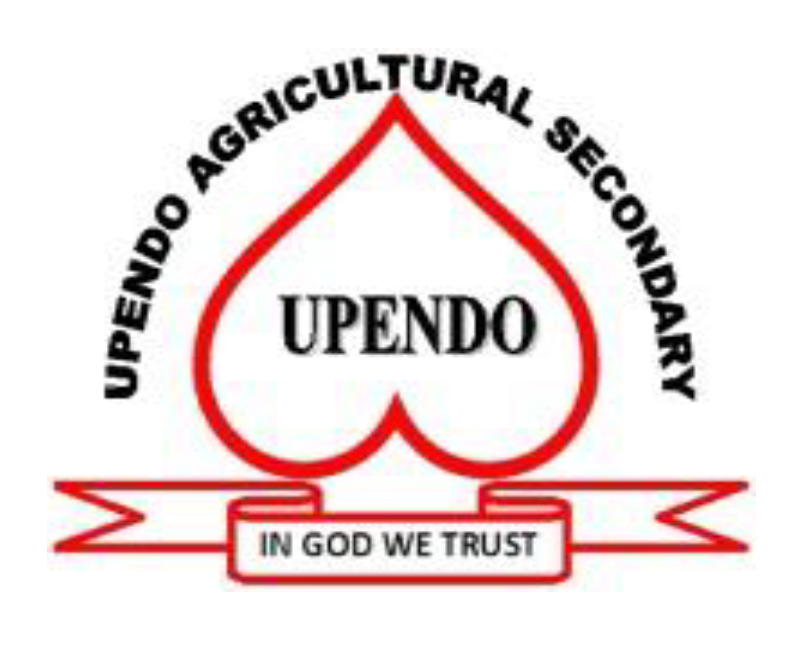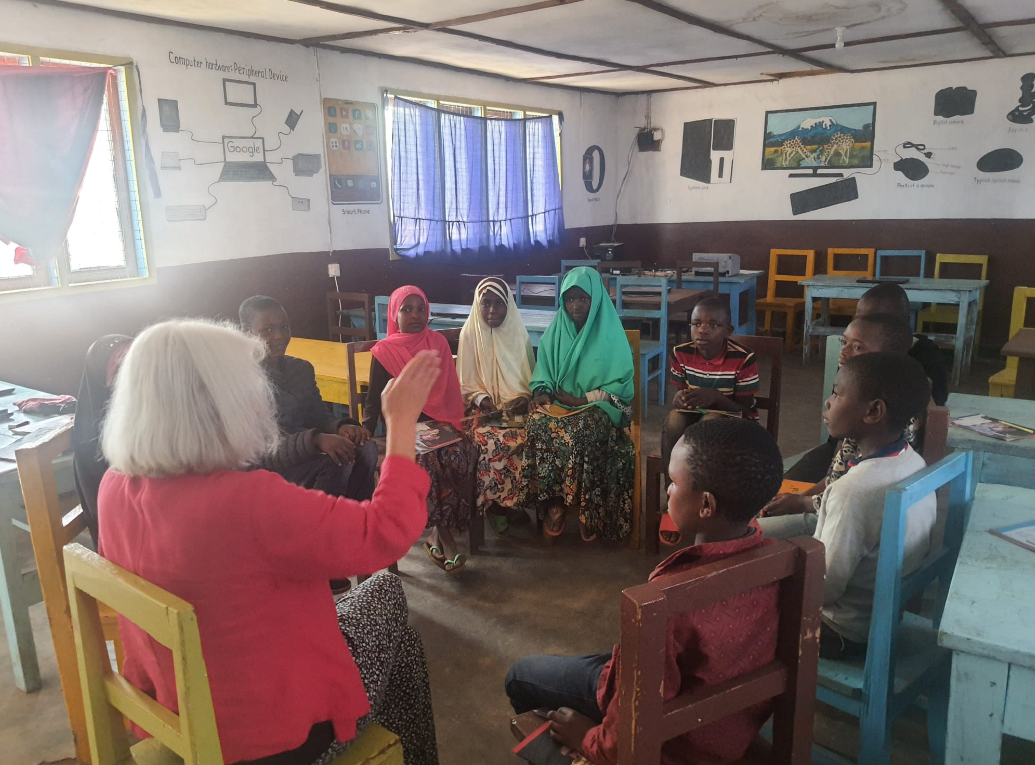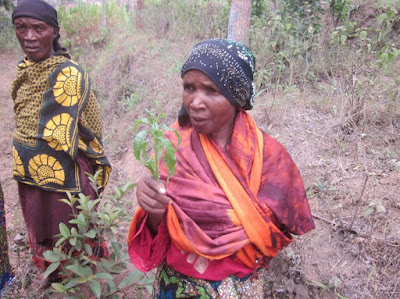By Geertruid en Hennie
volunteering @ MamboViewPoint in March 2015
After living and working for five years in
the Pare Mountains, right across the valley at the bottom of the MVP cliff and
many more years elsewhere in Tanzania, we eventually reached the Usambara
Mountains, 20 years after we left Tanzania. MVP invited us to assess how MVP
could contribute to an improved health care system in the area. A unique
opportunity for us, back to the region where our children were born and grew up
and where we felt so much at home..
 |
Steep slopes near MVP with the
Pare Mountains across the valley;
we lived there high in the mountains, in
similar environment. |
The 20,000 people of Sunga ward seek health
care from traditional healers, drug shops and drugs vendors at the market
and/or they go to a nearby dispensary of the government or the Catholic Church.
While the government provides generally free health services, people have to
pay for the private sector services, either in cash or in kind. What makes them
choose the shop, healer or dispensary probably depends on the confidence people
have in the service provider and/or on awareness about health, financial
resources or on the influence of relatives. Many probably use both systems: the
traditional and the modern.
We visited a selection of all the different
health care providers in the area and talked to health workers, healers, community
members and MVP staff. Each encounter with people offered opportunities to
discuss issues related to health and health care.
 |
| Relatives visit a patient in Kwai Health Center,
one hour from Mambo, run by Usambara Sisters |
The government health care system
There are 3 functioning dispensaries that
provide curative and preventive services 5 days per week; and 2 dispensaries
that are not yet staffed but the building is there and the community is waiting
for the services to start.
We visited all the five government health
facilities in Sunga ward and a few more in neighboring wards in order to get a
good understanding of the level of care, the services provided, the utilization of the services, staffing and the quality of maternity services. The building,
equipment and staffing is all very basic and on average 10 patients seek
curative care per day. The health services are so different from health care in
Europe but also very different from health services in Tanzanian towns. There
is not a single medical doctor or even clinical officer in the area, families
depend on health workers with lower level education while the referral system
to higher levels of care is not well developed yet. MVP staff feels rightfully
concerned about the quality of care and so do the people in the villages
around. Hopefully the government will soon deploy a few clinical officers who
have better diagnostic and treatment skills.
Though the quality of the curative health
care needs improvement, the preventive services are quite well organized.
Children are immunized; pregnant mothers have access to antenatal care
including HIV and syphilis testing and treatment and family planning services
are given free of charge
Mother and child visiting Sunga dispensary;
Meeting traditional healers and birth
attendants
The area around Mambo offers a colorful scope of traditional health care providers. We were eager to meet and consult
them in order to get a clearer picture of their specific role in the health
care of the local people. Soon after our
arrival in Mambo we visited the widow of one of the most respected herbalists
in the ward. She now tries to continue the herbal treatment of the villagers
and offers herbs and plants for free. A group of women from her area help her
look after the herbal garden.
We do not know whether the herbs are really effective
according to our scientific standards and understanding but the herbalist built
her wisdom on many years of experience and herbal treatment is well known and
often recognized worldwide. Researchers
in Tanzania are studying the effect of different herbs and plants. For common
diseases like flue, abdominal pain, or headache treatment with herbs and plants
is probably healthier then getting unnecessary antibiotics in a dispensary, as
is often the case in Tanzania
 |
The nurse in Mamboleo shows us the very well organized
and well-stocked government dispensary
|
We then visited a totally different
traditional healer in Sunga in his consultation room with open shelves full of
small glass containers and bottles with different powders. The healer Ramadhani
consults Islam based healing booklets and relies on an explanatory model of
illness that is very different from our way of understanding illness and health.
Mganga Omari, another healer, living near Mambo
Viewpoint, received us warmly and was eager to explain a lot about his way of
diagnosing and treating people. He is aware that children need to be
vaccinated, takes his own children to the government facilities when they are
very ill and actively seeks collaboration with MVP and visitors like us.
The wife of the famous herbalist near Mambo; she tries
to offer
the same services with support from a group of women in her village
During a three days walk through the
surrounding villages of Mambo, we met again another healer, well known in his
village. He claimed to have strong predictive power, to be clairvoyant: he is
able to predict illness even without the patient revealing his/her complaints.
When people are not well informed about the human body and how the different
parts and organs function, a healer like this man may impress the patient or
the relatives.
We asked all healers whether they treat all
diseases or maybe only specific complaints or illness. The majority claim that
they can treat all diseases except death; a few are more modest and admit that
they sometimes refer patients to the government health facilities nearby or to
the hospital in Lushoto.
Training the healers, raising their awareness
about the scientific causes of diseases and treatment protocols is probably not
the best way forward. The traditional healers, particularly the faith based
healers and witch doctors have their own specific way of understanding illness
and good health and have very limited insight in modern medicine. Mutual
respect may be the best option.
In the consultation room of the spiritual healer in
Sunga; different medicines in the cupboard
Traditional
Birth attendants
MVP has strong links with a group of women in
Tema who requested support to become more self reliant and better birth
attendants. We met the group a few times; strong outspoken women who are
learning to speak out, mould their own development and demand support from
authorities.
 |
Mganga Omari shows us the roots and herbs he uses in
addition to clairvoyance and rituals
|
 |
| Healer in Tema explains the use of the calabash in treating patients |
Some women in the Tema group have a
lot of experience as birth attendant and few were even trained by the
government years ago, but the majority are village women who help out when a neighbor delivers and their experience is limited. A Dutch qualified midwife will soon train the Tema group and with more knowledge and skills the women
will hopefully refer most pregnant women to the health facilities. The
government wants all women to deliver in a facility but the reality tells us
that this is not so easily achievable.
Distance, quality of care in the facilities and culture play a crucial
role in health seeking behavior.
 |
The group of TBAs in Tema; motivated to get more
knowledge and skills to help their community
|
Exploring
homestay places
Three days long we discovered the surrounding
villages of Mambo on foot, together with Maud and JP who were supporting the
management of MVP Eco lodge. We spent 2
nights with local families and visited different community based projects or initiatives
during the day: a pottery project; water pumps; vegetable gardens; a dispensary
built by the community; some traditional healers and TBA. Everywhere people
know MVP and talk positively about the support and opportunities for
development received.
Homestay in Tema; we slept in the wing on the right
side of the house.
It was a real privilege to stay in the homes
of local people, to feel so welcome and sit with the family in the kitchen,
watch them prepare the dinner for their children and for us and discuss their
main concerns etc. It proved so helpful that we speak Swahili; it makes it so
much easier to talk with the people, explain who we are, what we do, think,
like… ask questions, laugh together and share some intimate thoughts.
The homes were comfortable and the care was
great. The families had improved the
bath- and toilet facility; the children and parents will automatically benefit
as well; small steps forward.
Preparing the
dinner with the neighbor. Women spent a lot of time on food preparation
Mtae village is the capital of the division
but just a village with only a few shops, a dispensary of the government and a
large Lutheran compound with a church, a large graveyard, a community meeting center and a big health facility that is no longer functioning. While they are expanding the church building,
the health unit will turn into a ruin unless it gets a different purpose. The
division has its headquarters here but the office looks small and under
resourced. There is no ambulance but the public bus service reaches Mtae
village.
The children join the parents and the guests in the
kitchen; the stove is made of mud and smoke is controlled through adequate
ventilation of the kitchen. The construction of the stove reduces the firewood
needed for cooking
Along the village roads we see the farmers
preparing the fields for planting and sowing.
In some years the farmers can harvest potatoes three times a year, a
high yielding cash crop; with the money they get the farmers buy maize, their
main staple food. Around Tema village farmers are working on well-planned
terraces to prevent erosion. It is strange that not all villages construct
terraces. We pass the a few bridges and a water pump that were constructed with
MVP support. The support of Mambo Support Foundation is tangible here.
The
environment
What a beautiful area with amazing views
across the valley and the steep cliffs; with villages scattered over the hills
and valleys and surrounded by tropical forest on a few sides. We walked half
way down the steep hills towards the valley, along fields where mainly women
and children were busy clearing and planting. After the work the women and
children climb up the hill with firewood, grass or maize stems for the cows on
their heads. A woman or child will not easily walk without anything on the head
or back. Time is too precious for them. They collect firewood, water, and food
for the animals at home or goods from the shops or markets. Every walk confirms
our impression that women play a key role in the welfare of their families,
they seem to always work.
The tropical natural forest, the villages
Joseph, a guide of MVP, accompanied us on a few walks.
He knows a lot about the area, the local customs and its people. On our way we
meet with children carrying grass for the cattle at home
with markets and water points where people meet; the fields with cabbage,
tomatoes, wild egg plants and maize; the shops with many people selling the
same goods; the carpenters and tailors; the roads that are ever bending and all
made of gravel or sand; the goats, sheep and chickens everywhere. One pair of
eyes is not enough to see it all. So we
will have to come back!
 |
Fields along the road with elephants grass for the
cows, holes for potato planting and cabbage deep down in the valley
|






























































